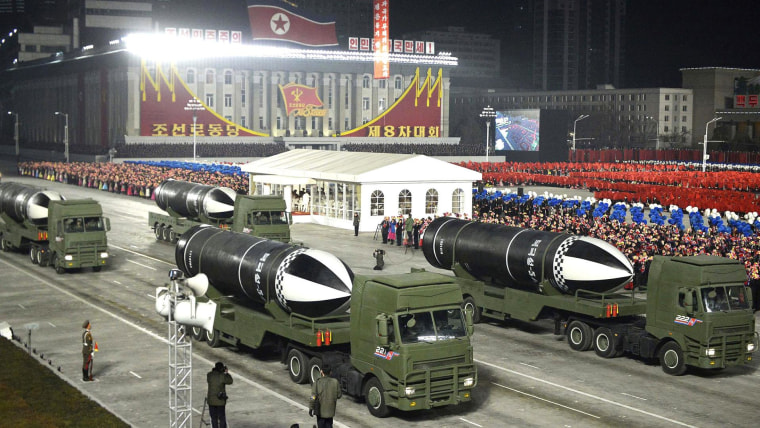The U.S. will face “a very grave situation” because President Joe Biden called North Korea a serious threat, a senior foreign ministry official in the secretive communist state said Sunday.
Biden made a “big blunder” in his first address to Congress last week, when he criticized North Korea and Iran’s nuclear programs, Kwon Jong Gun said in a statement released via the KCNA state news agency.
Calling them “serious threats” to the U.S. and world security, Biden said he would work with American allies to address those threats through “diplomacy” and “stern deterrence.”
But Kwon said his speech “clearly reflects his intent to keep enforcing the hostile policy toward the DPRK as it had been done by the U.S. for over half a century.” DPRK stands for the Democratic People’s Republic of Korea, the North’s official name.
Kwon added that his country will be compelled to press for “corresponding measures,” and, with time, the U.S. will find itself in “a very grave situation,” without elaborating on what that situation might be.
Download the NBC News app for breaking news and politics
NBC News has reached out to the State Department for comment, but the White House said Friday that the Biden administration had completed a “rigorous” review of its North Korea policy, settling on a new approach to pressure the pariah state to denuclearize.
Rather than seeking a “grand bargain,” White House spokesperson Jen Psaki said the new policy would be a “calibrated, practical approach that is open to and will explore diplomacy with the DPRK.”
Former President Donald Trump became the first sitting American president to set foot on North Korean soil in 2019. But despite Trump holding several high-profile meetings with North Korea’s leader Kim Jong Un, relations soured and talks about the denuclearization of the Korean peninsula ended without a deal.
Days before Trump left office in January, Kim called America his country’s “arch-enemy,” which should be brought to its knees.
In a further show of strength, the North launched two ballistic missiles into the Sea of Japan last month. Satellite images also showed renewed activity at a North Korean nuclear facility.
The fact that North Korea’s latest response did not come from the top of the regime, coupled with the lack of detail about its next action is a way for the North to leave the door open to both diplomacy and escalation, Ramon Pacheco Pardo, a lecturer in international relations at King’s College London, told NBC News.
“In my view, North Korea will simply wait to get more details about the Biden administration’s North Korea review and then take it from there,” he said.
Mason Richey, a professor at Hankuk University of Foreign Studies in the South Korean capital Seoul, agreed that the response was typical of the regime, but he added that the North was nonetheless “announcing that it will drive a very hard bargain.”
Adding to the rising tensions, Kim’s powerful sister, Kim Yo Jong, criticized American ally, South Korea, on Sunday over anti-Pyongyang leaflets were floated across the border by a group of North Korean defectors in the South, which she called “an intolerable provocation.”
“Displeasure can not be hidden over such sordid acts,” Kim, who is a senior official in her brother’s government, said in a statement, also carried by KCNA. She added that the North will look into how to retaliate as it can longer remain “an onlooker.”
Reuters and the Associated Press contributed to this story.
Stella Kim contributed.
Source: | This article originally belongs to Nbcnews.com











